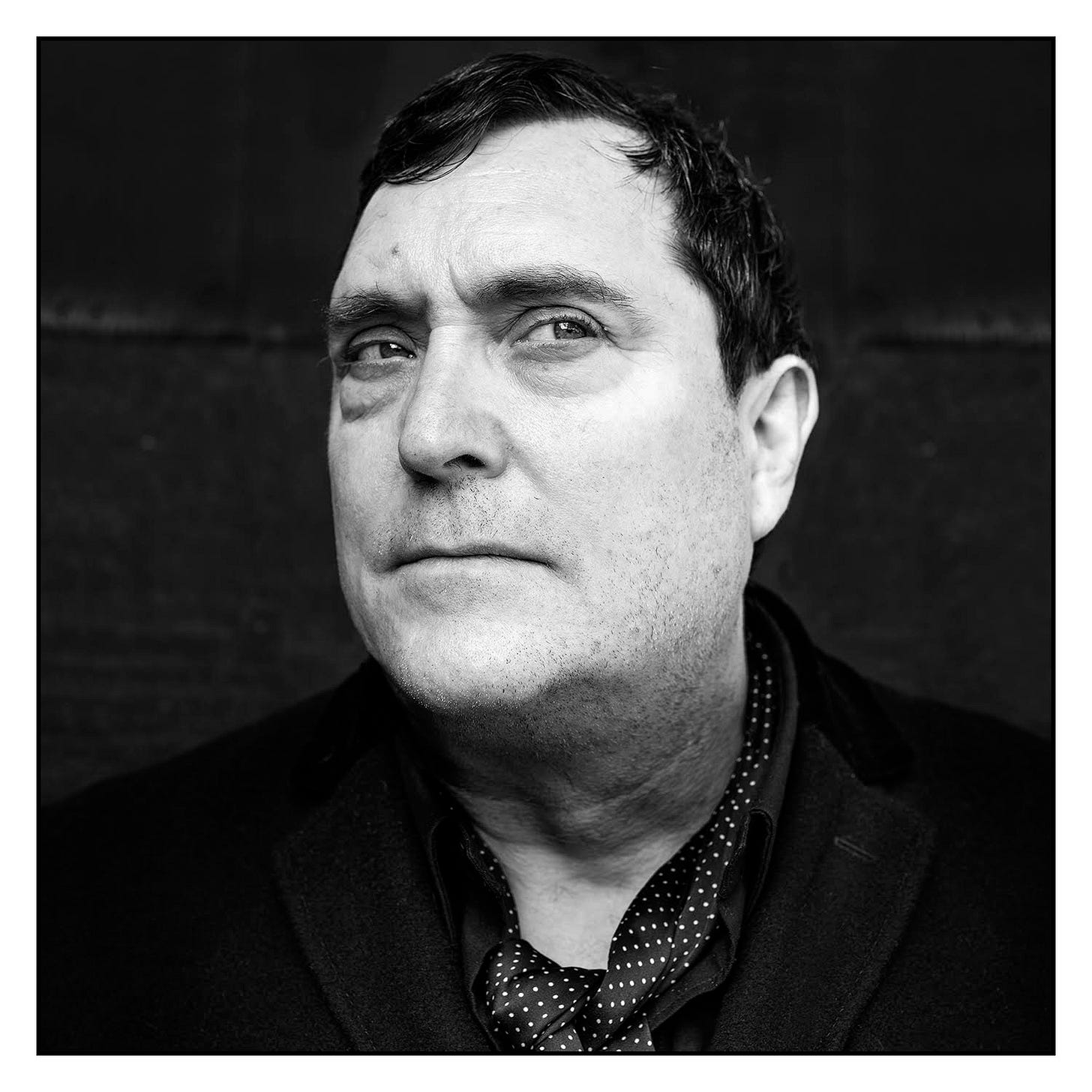Alright, here we are again, not exactly on time, but worth the wait I think you’ll agree. And thanks once again for all the feedback - honestly this continues to be the most interesting publishing adventure, it actually feels quite wild to have something book-sized or bigger growing month by month. If you’re a new subscriber, please do dig into the archive: I know I keep saying this (indeed the topic comes up again within this interview itself), but it’s having the conversations side by side that really makes it. People from different generations, different backgrounds, different places all telling their experiences of a broadly similar section of history maps out hidden shapes within the culture in a way nothing else can.
Richard Norris couldn’t be a better vehicle for that process. I’ve been listening to his music for two thirds of my life, ever since I first heard The Grid on Annie Nightingale1. They were part of a movement around Creation and Heavenly records and the late Andrew Weatherall where alternative culture met Balearic / acid house, and circa 1990-91 that was me, completely2. Norris was also writing for the NME at the time, one of the few people who was able to explain what was going on among the madness of acid house to a curious remote teenage reader. Since then he’s been everywhere and done everything - there’s no question that like his friend Weatherall he could have been a much bigger name if he’d chosen that path, but as we’ll discuss, he was far more interested in the road less travelled, in quirky corners and odd little scenes.
I’ve got to know him quite well recently, particularly since he’s been doing ambient Music for Healing which especially came into its own during Covid. I wrote about that here, and did a DJ mix for his Group Mind collective during the first lockdown which is here and which I can genuinely say did help to keep me on the level during that deeply weird time. I’ve also very much enjoyed the Journey To Nutopia events he’s been involved with alongside all sorts of countercultural figures like John Higgs, Daisy Campbell and co. He knows EVERYONE, which makes him a perfect participant for this thing: his story overlaps not only with the obvious music figures we’ve spoken to, but he and Robert Fripp even made a concept album about Philip Hoare’s Leviathan.
I’m not going to detail all Norris’s achievements here, because 1) there’s too many as you’ll see just from his first answer alone, and 2) he’s just told his life story in a book for White Rabbit Books which is coming out in just a couple of days. Because of that fact, this interview doesn’t follow the usual chronological format - we were able to dive right into the deep end of our favourite topics, the nature of subculture, creative working methods, and staying interested in stuff - and it’s all the better for it. Norris is a very nice man, but even more than that his creativity is infectious. This is someone who never takes their position for granted, has no truck with coolness, and always approaches things afresh. We touched on everything from Balearic colonialism to Divine, The Vengabus to the importance of smells. Doing this interview was a genuine tonic, and I hope it is to read, too.
.What are you working at the moment aside from the launch of the book?
I'm doing Oracle Sound3 Volume 3 - I'm four tracks in, I'll be done by the end of the week... I mean I've got more tracks, I'm just mixing them. I want to get it done by the weekend, because Saturday I go off on the book and DJ tour excursions and that just goes on basically from then, so I just want to get something done and out. Pressing vinyl takes a while anyway, so I want to get that ready. What else? The return of Beyond The Wizard's Sleeve4... we've done three remixes so far: Fat White Family, a new version of Flowered Up “Weekender” and one other one. So that's all happening again, we're going to be doing some DJ action with that, in fact Erol's coming to play with me under an assumed name this week. That's all kicking off again in our strange time loop that is Beyond The Wizard's Sleeve that seems to be out of time and have gaps of five years or so...
Then – even longer gaps – the return of The Grid. We're already looking forward to gigs, we're signing to BMG imminently – next week or two – and there's going to be a massive reissue programme that we're a bit of the way through... so that, and the book. It's a lot really – a lot of dates this year, the book talks are already running to 20 dates by themselves. Theres's a lot going on really. Then I'm starting to think about more writing – oh and actually there's one you might be able to help me with, I'm starting a new Salsoul boogie type band, the idea is to do kind of Chic meets SAULT collaborative production unit really, and I'm just digging around and finding players, I've got some really really good players: people who've been on “Murder on the Dancefloor", “Like a Prayer", “Rolling in the Deep", and that's just the drummer and the bass player. Partly it's just an excuse to find interesting people.
One guy I'm trying to get in touch with is this guy Elliot, who I met a couple of years ago at this Suzanne Ciani event in London, talked to him, he was just this dry New Yorker, didn't know who he was, looked him up afterwards, turned out he'd played on every record in New York in the 70s, and he'd played the lead solo on “Fame” so I was like “YES! We want that guy” He played on “Reeling in the Years” and turned down joining Steely Dan full time. So I'm getting a crack team of really good musicians and writing a load of disco, basically, because I love the fact you can be ultra cool at one end and wedding disco at the other and everything in between.
It's quite difficult in pop to be quite credible and mass at the same time, it's quite hard – it's something we always tried to do with The Grid – but we're trying to do that within genre. It's great, it's such fun to write, looking back on all the styles, because there's so many variations within that area – if we did it as just boogie that would be amazing, but there's just tons of possibilities. Got some really good Salsoul type ones coming with these incredible players, but the only thing we haven't 'got is a singer, so if you know anyone good I'm scouting the land for a singer or singers – the rest of it, the records and the label action and stuff will fall into place when we've got the tracks, I'm going to pay for people to go into Strongroom we'll do a week in there and get this together. I think it's got potential, this one, it really has.
And it's song based, very song based. Listening to things like “Was That All it Was” and “Young Hearts Run Free” and “Native New Yorker” – I mean, “Native New Yorker", Sinatra was going to do it at the same time he did “New York New York", and you listen to it and think, yeah it is actually that big a song, the lyrics are amazing. So as well as extended disco grooves and DJ Harvey remixes I'm also thinking of songs and lyrics and stuff – so that's my grandiose overshooting! But it's weirdly coming together and it may work, there's a big new label coming which there's talks about doing with... so yeah, so that's a random thing, but mainly it's book, book tour, Oracle Sound, Beyond The Wizard's Sleeve and usual Bandcamp stuff. Enough to keep me going.
Fantastic, well that gives me quite a few jumping off points, which is really good because normally for these interviews, they've tended to go through the person's life story and see how they've interacted with subculture – but you've already done that in the book... so we'll have to be quite freewheeling here. One thing that leaps out there is the time travel thing you talked about there with The Grid and Wizard's Sleeve sort of popping in and out of wormholes. It seems like that's common in your life story as told in the book, that there are running threads that have always been there – you come across things and rather than them being epiphanies, it's almost like they confirm the way the world is to you.
Yeah. I think it's because I've been searching for very few things. I've always been looking for a psychedelic dance music – like that's it for what I do, mainly as a studio based music. Then I've been looking for that magic in a club. Which is why I seem to pop up everywhere in different cultures and genres and scenes, because I just love that moment when you know that there's magic in the air. And you really do know, don't you? It's tangible, it's that feeling, and it could be anywhere from a tiny club behind Heaven or going to see the first Brian Wilson gig when he came back – the magic in the air there was so tangible you could almost cut it. It was really there. Just chasing magic and chasing psychedelia in its many forms – many different extensions of it, could be mass dance music like The Grid, could be odd little psychedelic reissues, could be ambience or anything else in between really. I don't really see much distinction between them, and I'm definitely not someone who sticks to one style.
That knowledge that The Thing can be there in big arenas, just as much as it is in five people having a party is kind of key to what Brian and I have done over the years. In fact way before Bass, Mids, Tops, 15 years ago when we started a blog, I wrote a little manifesto type thing5 which included the idea that “underground” didn't mean more extreme, or more obscure, or more druggy, but was just about a set of hidden connections between people's unconscious minds, and those connections ran through the pop charts and radio staples just as much as they did through ultra credible scenes.
I really noticed it at Carcassonne, at the Weatherall festival6 last year. The kind of people that you get their, their ethos and attitude, the way they behave and interact with each other... There's 1500 people there and I was thinking, well OK you could have a conversation with any one of these people and you've got a connection almost instantly. It could be myriad very different connections, but there's something that brought them all together. You get that to a degree in a lot of places, like I've been to mod weekenders lately for example, but there was something about this one that was just much more so. Talk to anyone and you'll have one if not a hundred things in common and you'll know 50 people quite well in between you – and I thought that was great testament to... well a great testament to Andy Weatherall, but also a great testament to what club culture does and the way we use it. I think I know about three people from university, and I know about 30,000 from going out clubbing – and interact with those people on a regular basis and many of them I've known for decades. It is weird and yes you're right it is subconscious, you don't really have to think about it. I loved what Emma Warren said in her book7, that it's not just the DJ, it's the guy in the hat-check place and the bouncer, the staff, all of the elements have to be there, it's not any one element over the other elements, it's the collective “scenius” of it that's very important. And in terms of connections that can go on for decades I think it's really vital, those kind of scenes that I've been involved with since just after punk really – the whole DIY 7” single and putting on gigs in church halls and things like that – there is something that draws them all together, and you kind of recognise it almost without thinking. What was interesting in Carcassonne was really seeing and feeling that in its purest form. A lot of people mainly from the UK in France, not like a bunch of tourists, but a bunch of people with a very shared agenda.
Well of course Weatherall's ability to be a catalyst for all that was in some ways very deliberate on his part, because he was a student of subcultures – not just club culture but everything he came in contact with he devoured and studied the microscopic detail of the fashion and the stances and the language and the books people read and all of that...
Yeah absolutely.
There was a thing that bloody Elon Musk tweeted recently: he was talking about his brain interfaces and all that guff, and he said something like the human brain's output is between ten and a thousand bits per second – like, that many zeroes and ones8. And I thought, wow, could there be a better encapsulation of the reductionist, transactional tech bro mindset? Like in a face to face environment, and especially in a crowded one with music, if you add in all the subtleties of facial expression, of stance, of tone, of micro facial expressions as they appear under a particular type of lighting, of shared reference points with the person you're talking to, of the angle of your hat, of movement relative to all the other bodies in the space – all of that – the bandwidth of what's being communicated is immense. And it's that understanding that someone like Weatherall is able to encapsulate and pass on.
Absolutely, absolutely. I think we were fellow travellers around the same time. As I detail in the book, I met him at Shoom, and we went through stuff like him remixing “Floatation” and sharing an office with Boys Own very early on, then stayed in touch over the years – and there was a fellow-traveller aspects to that. The number of people who had grown up with alternative music and John Peel and Rough Trade and DIY was... well it was a minority in terms of acid house ravers. Certainly the initial ones, anyway – the ones that I would have known in London, not sure if it was the same everywhere else – were more likely to have come from football or from soul weekenders rather than from Chris & Cosey! So we did have many shared interests early on, and I was introducing him to Jeff Barrett9 and saying “I know you two are going to get on” – as it proved to be – and all those early connections came naturally, because there just weren't that many people with those shared interests to connect. As I get older I realise more and more that one of my favourite things is to connect people, not because of any sort of personal gain or any sort of ulterior motive, purely because when you find someone and know that they're going to get on with another one of your mates – I love that! It's just great to see. Then they get on and go off and do that with other people.
Keep reading with a 7-day free trial
Subscribe to Bass, Mids, Tops and the Rest to keep reading this post and get 7 days of free access to the full post archives.







